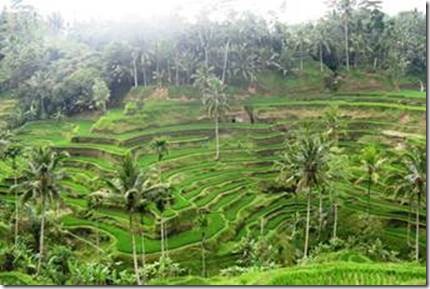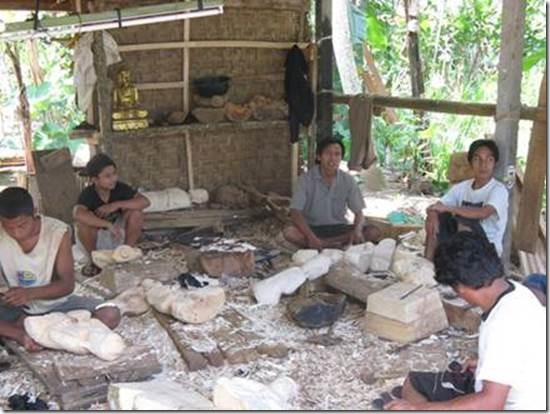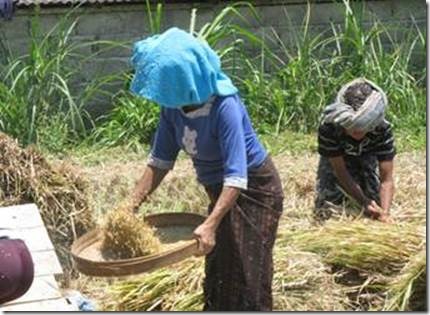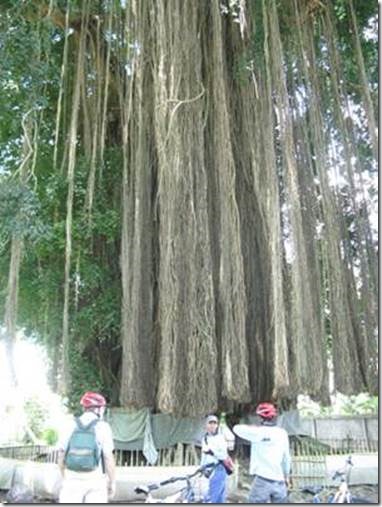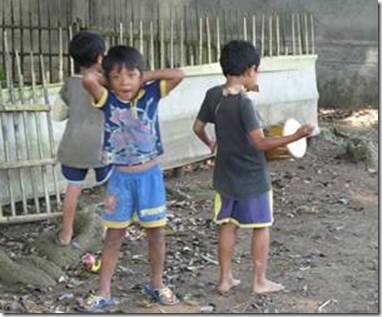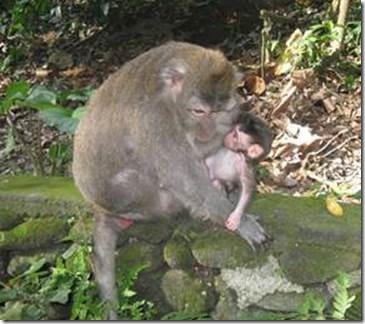While walking along the beach at Gili Air back at the Mataram anchorage we had met a couple traveling around Indonesia. They had been to Ubud and had done an Eco Cycling Tour. Randal added it to our list of things to do in Ubud.
From the leaflet about Eco Tour……..
“Experience the magic and feel the spirit of rural Bali on our famous Eco-Educational cycling tour (suitable for all ages.) We’ll pick you up at your hotel and drive you up to Penelokan (Kintamani) where we’ll breakfast overlooking the active volcano, Mount Batur and its crater lake.”
“ After breakfast we’re off on our mountain bikes through the heartland of Bali, traveling downhill on secret back roads and minor village roads (with no traffic) experiencing untouristed, typical Balinese daily life and enjoying the beautiful Balinese countryside to Ubud.”
The tour was a full day. We were picked up at 7:45 and go back to Ubud about 4:30. First stop was a photo op of a terraced rice field. They are so unique with lovely color patterns.
Next stop, breakfast overlooking the spectacular Mount Batur. 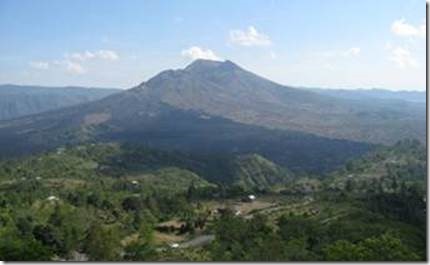
Randal and I had eaten a wonderful 7 am breakfast of fresh fruit and banana pancakes at our hotel. So, though I wasn’t really hungry, I did manage to eat one of the restaurant’s banana pancakes and a chocolate pancake just to be on the safe side. Lunch wouldn’t be till after 2 and our bike riding.
Still driving in the van, we stopped to visit a small plantation where we tasted coffee and tea and learned about local fruits, spices and how the first stage of the special expensive Balinese coffee is passage through the intestinal system of a civet cat!
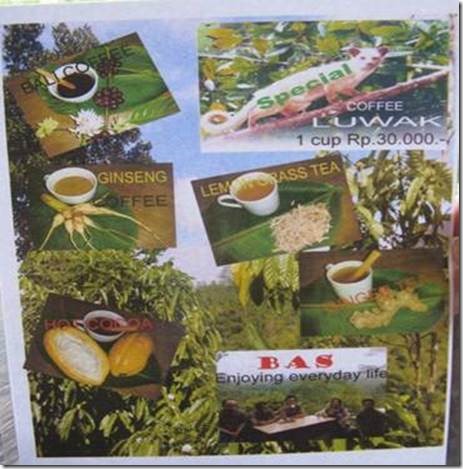 No one opted for the Luwak special coffee. I tried everything else and they were all good; the coco being very chocolaty.
No one opted for the Luwak special coffee. I tried everything else and they were all good; the coco being very chocolaty.
Then finally to the bicycles. I am always a bit apprehensive of any bike other than my own. These bikes had plain flat pedals with no toe clips. The brake system was a bit unusual and we rode on the left side where Balinese drive. Right turns were the trickiest since you turned right but had to end up on the left side of the road. It was all a gentle downhill ride. They did provide bike helmets and rain gear if needed.
We stopped to visit a local family compound, where they made bamboo matting for floors and ceilings; 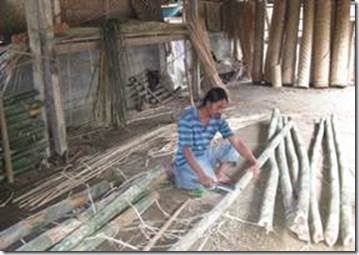
The man is working on the cut bamboo beginning the process that will end with the woven bamboo mats standing at the top right hand corner of the photo.
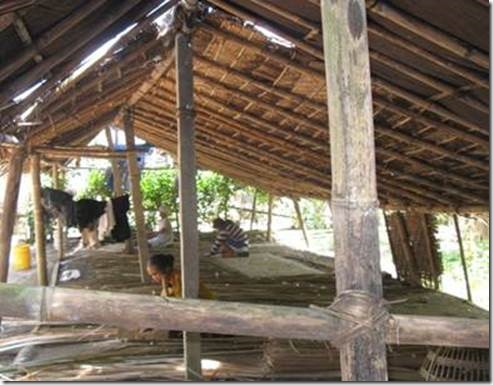 Women creating the thin strips of bamboo for weaving.
Women creating the thin strips of bamboo for weaving.
The whole family worked on the bamboo products. BBC Dharma said. Bamboo, banana and coconut tree products were the product used for production and for daily life. Dharma said that many people never travel further than Ubud in their lives! Electricity and television have come after Kennedy was president! It is also a structured life with a more moderate form of caste system. Most people in Bali are Hindu while the rest of Indonesia is Muslim.
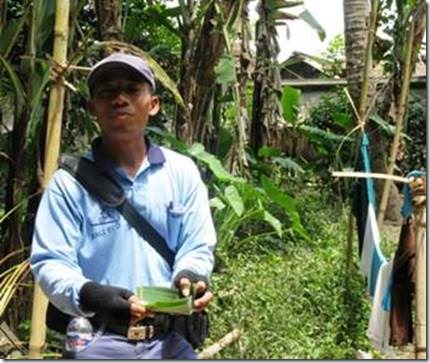 Dharma holding a banana leaf. Banana leaves were used as plates, spoons, bowls, everything. And when no longer needed, they could be thrown on a heap to return to the earth. When plastic arrived in these rural areas it was treated like the banana leaves. Caused lots of problems. People had to be educated as to what plastic was and that it wasn’t disposable like the banana leaves. We should have stuck to banana leaves.
Dharma holding a banana leaf. Banana leaves were used as plates, spoons, bowls, everything. And when no longer needed, they could be thrown on a heap to return to the earth. When plastic arrived in these rural areas it was treated like the banana leaves. Caused lots of problems. People had to be educated as to what plastic was and that it wasn’t disposable like the banana leaves. We should have stuck to banana leaves.
The family also raised pink Balinese pigs and black Australian pigs. The original plot of family land was divided among the sons. The youngest son was expected to stay forever and care for the parents and their land was therefore left to him. Dharma was the youngest son in his family. His story was a bit like Rusli’s, our guide in Tana Toraja. Both men are about 40. Their family was very poor so they gone to work away from home as children; had managed to get an education and learn English so they could work with the English speaking tourists. When he was 14 Dharma went off with a family from Java only to find himself the household drudge working before sun up till late at night. He was determined to go to school and did along with all of his household tasks. . He managed to learn English well enough so finally left the family to work in a hotel where his brother was already working. He worked as a cleaner too shy to use his English. Encouraged by his brother, Dharma eventually learned most hotel jobs and worked while putting himself through university to graduate with a degree in English. He returned to Ubud and became a teacher. Soon after that he became a tour guide for the Australian Eco Tour Company. By telling us his story, he was telling us the story of many of his generation. Culture dictated that as the youngest he must return to his family home to live with and care for his parents. Understandably, his wife and mother took several years to work out their relationship. He has 2 sons, but won’t expect the youngest one to take care of him. He will expect both of them to work together. Children are the Balinese Social Security System. If you read eat pray love, you will learn a good bit about the culture. I was familiar with much of what Dharma told us from reading Elizabeth Gilbert’s book. (However, Lori who moved to Ubud 17 years ago from one of those out west rugged U.S. states, and helped found the local library, said she had a different view of Balinese society but allowed that Elizabeth Gilbert had different experiences so probably valid opinions.)
a rice field to watch the workers process the harvested rice;
a huge banyan tree with dreadlock vines hundreds of years old upstaged by a ragtag band of kids and their simple musical instruments and lots of beautiful countryside.
Dharma called it the “rasta” tree because of its long dreadlocks. We had snacks of water, bananas and crackers. Some for the local kids too. They played their musical instruments drowning out Dharma. The boy with the drum has a cracker in his mouth, not an harmonica.
At one point the downhill ended and short, steep uphills began. We were offered the chance to get off the bike and ride in the van. One couple, probably the youngest there, got off the bikes. After some steep uphill when everyone tried to figure out their shifting systems, more people took the van. One woman, having fallen off her bike for the second time, also stopped riding. Finally it was one man from Iceland, Randal, two guides, and me. I had left my pack in the van with my Gatorade so the heat and the hills were getting to me. The secondary guide, Randal and the Iceland man went on ahead and Dharma, our primary guide rode with me. At the very last part when we hit the main road, I stopped. I knew I could make it eventually, but everyone would have been long done with lunch by then. I didn’t want to hold up the works so Dharma called a van to come get us. It really wasn’t so far to the restaurant, but I wan bonked and that was that. Food was great. It was a buffet, but I didn’t overeat because I was still to hot to be hungry. Back in the van we headed back to Ubud and our last stop. The Monkey Forest from which Monkey Forest Road gets its name. What a hoot. Hundreds of monkeys behaving like monkeys. I bought $.50 worth of bananas for 2,000 rp (about $2.30) but one of the biking couples took half for 1,000 rp. It is hard to hold lots of bananas and try to feed individual monkeys. They know you have more. I took way too many pictures but it was so entertaining. Monkeys are silly until you look them in the eye and then you are amazed. Mom monkeys with babies were most fascinating to me. Some of the babies were just so tiny!
After about an hour Randal and I left the forest and walked back to Ubud center. It had been a great day and we had both enjoyed getting on bikes again.
I have so many more photos of each stop we made. Wish I could send them all.

